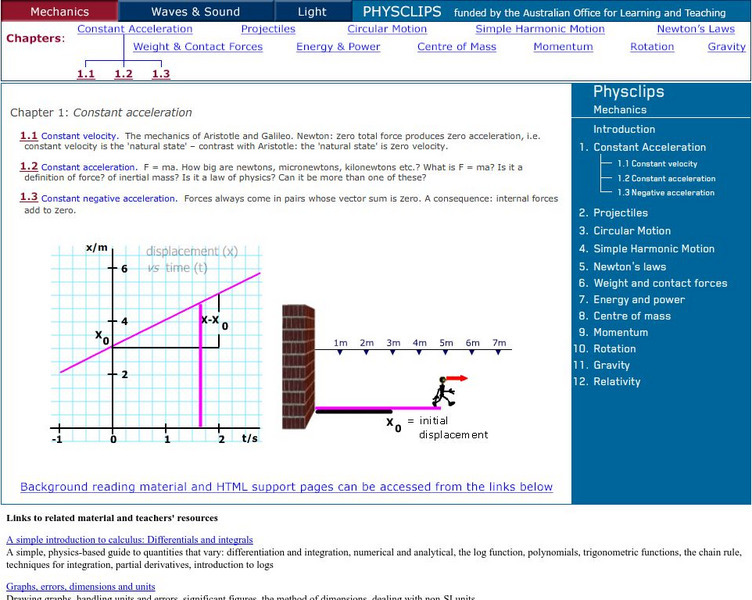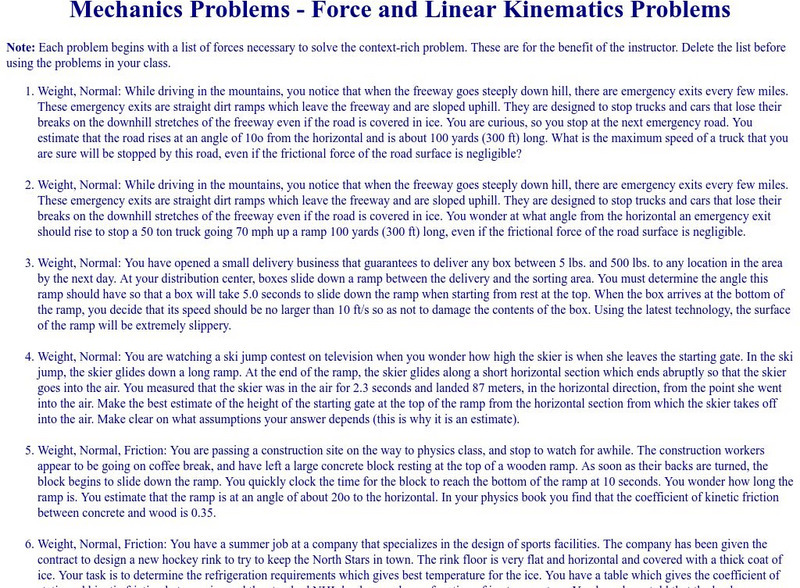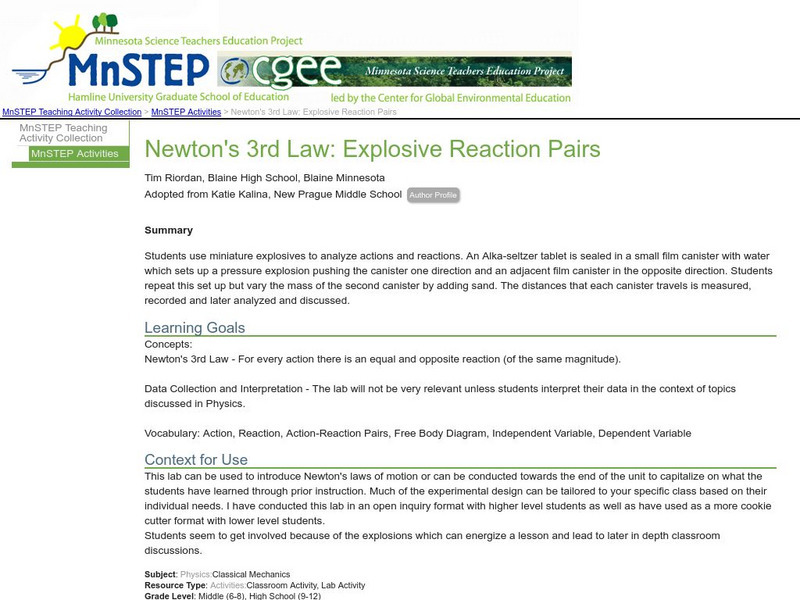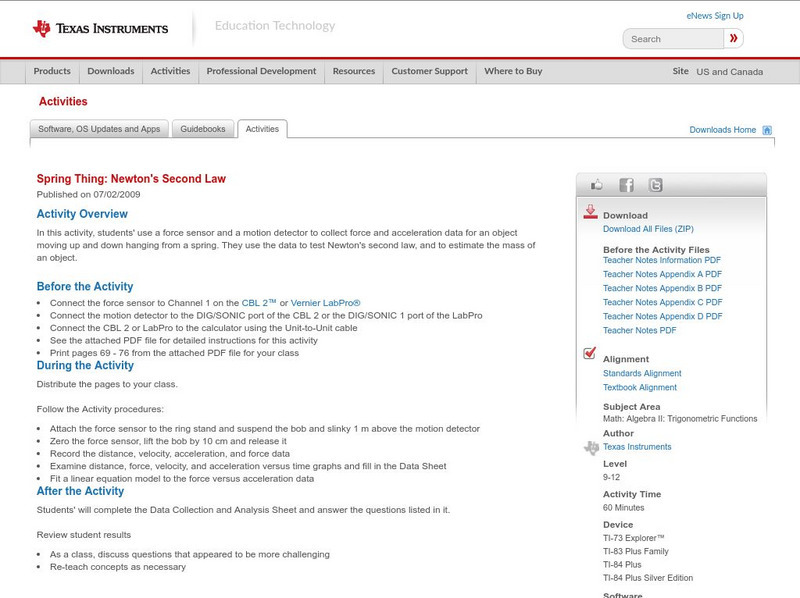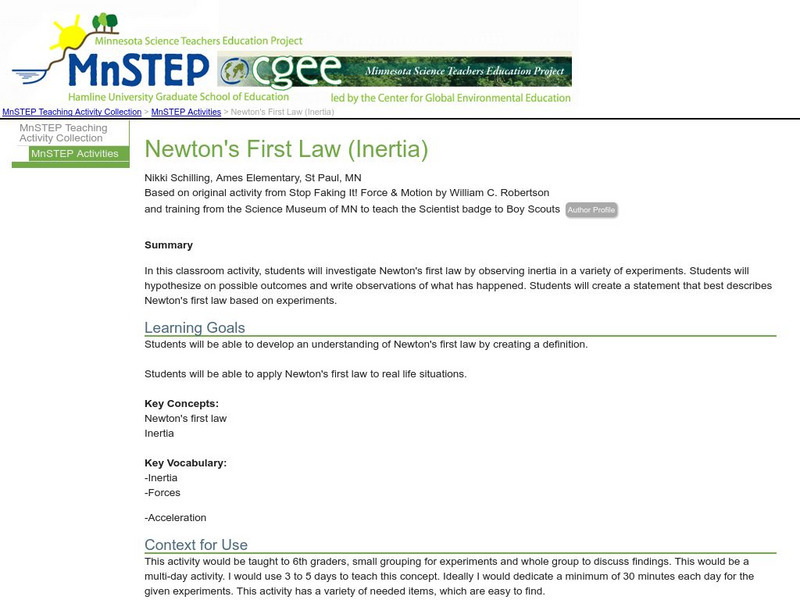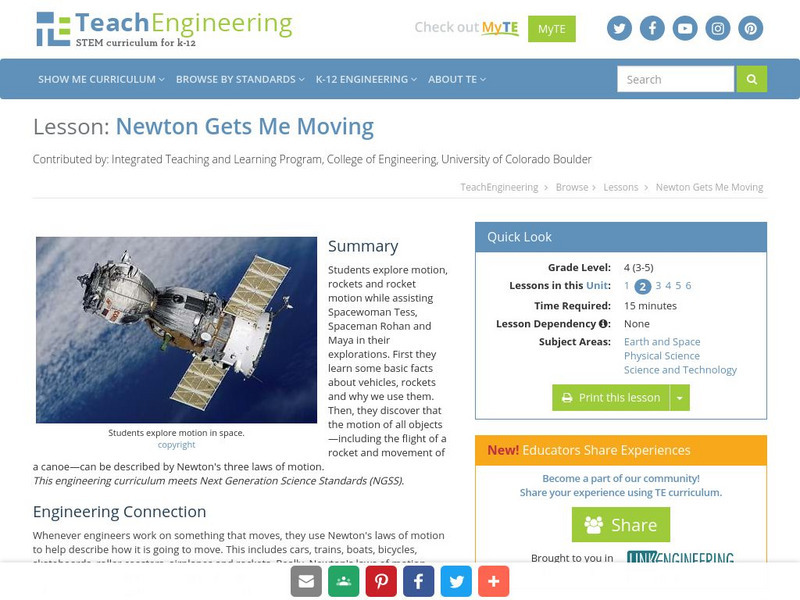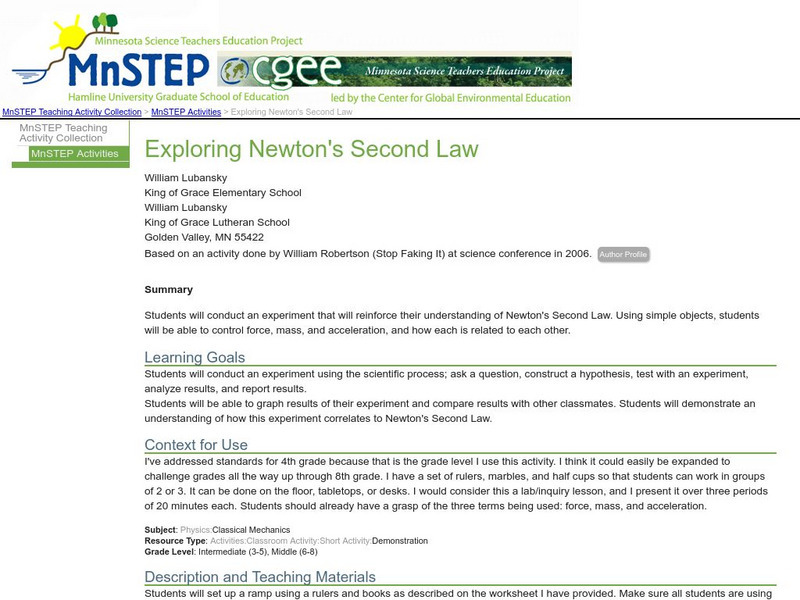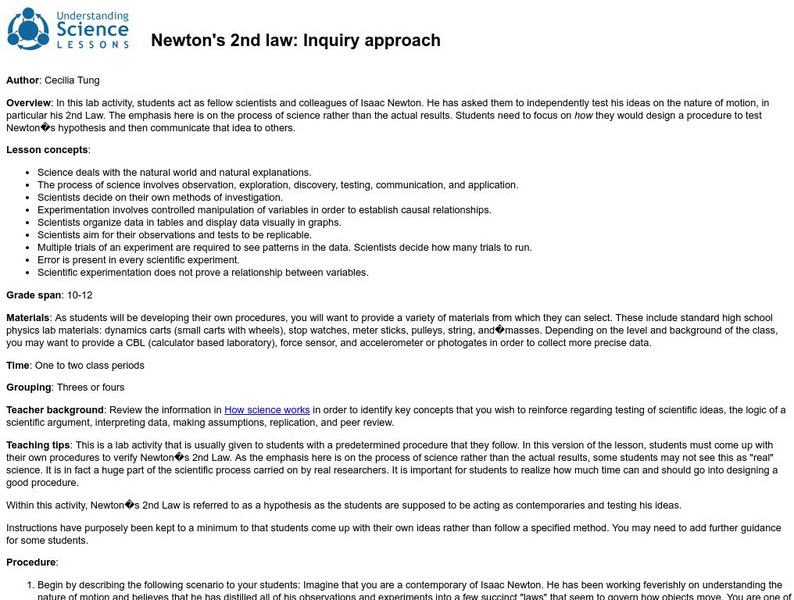Annenberg Foundation
Annenberg Learner: Amusement Park Physics: Roller Coaster
Learn about Newton's Laws of Physics, g-force, the causes of motion sickness, and more by reading about different rides at an amusement park.
TeachEngineering
Teach Engineering: Flying With Style
As students begin to understand the physics behind thrust, drag, and gravity and how these relate these to Newton's three laws of motion, groups assemble and launch the rockets that they designed in the associated lesson.
Utah Education Network
Uen: Rock a Bye Pendulum
Activity uses scientific process to explore the effects of force on an object in motion.
University of New South Wales (Australia)
University of New South Wales: School of Physics: Physclips
Physiclips thoroughly presents mechanics concepts with animations and film clips.
Yale University
Open Yale Courses: Fundamentals of Physics
Intended for students with a strong math and science background, a course introducing physics concepts of Newtonian mechanics, special relativity, gravitation, thermodynamics, and waves. Twenty-four class sessions in video format are...
TryEngineering
Try Engineering: Blast Off
Hands on activity where students focus on aerospace engineering to investigate space flight from the viewpoint of an engineer. They design, build, and launch their rocket, then share their experiences with the class.
Science4Fun
Science4 Fun: Isaac Newton
Brief biographical sketch of Isaac Newton, famous scientist whose discoveries include the law of gravitation, three laws of motion, reflective telescope, and calculus.
University of Minnesota
University of Minnesota: Mechanics Problems: Force and Linear Kinematics Problem
This University of Minnesota site provides a series of contextually rich problems pertaining to force, Newton's second law of motion, and linear kinematics.
Science Education Resource Center at Carleton College
Serc: Newton's 2nd Law: Inquiry Approach
In this activity, students test Isaac Newton's ideas on the nature of motion, in particular his 2nd Law. The emphasis is on the process of science, investigation, and experimentation, not the results. Students must come up with their own...
Science Education Resource Center at Carleton College
Serc: Trucking and Thinking Newton's First Law of Motion
In this activity students simulate the movement of cargo in the bed of a truck in order to experience Newton's first law of motion.
TeachEngineering
Teach Engineering: Newton Rocket Car
The purpose of this activity is to demonstrate Newton's third law of motion - which states that every action has an equal and opposite reaction - through a small wooden car. The Newton cars show how action/reaction works and how the mass...
Science Education Resource Center at Carleton College
Serc: Newton's 3rd Law: Explosive Reaction Pairs
This lab can be used to introduce Newton's 3rd Law of motion - For every action there is an equal and opposite reaction (of the same magnitude). In this exercise, students use miniature explosives to analyze actions and reactions.
Museum of Science
Museum of Science and Industry Chicago: Online Science: Drop Eggs Into Cups
Step-by-step illustrated instructions showing how to drop four eggs into four cups without touching them. Demonstrates the concept of inertia according to Newton's first law of motion.
Science Education Resource Center at Carleton College
Serc: Experiencing Newton's 3rd Law With Match Stick Rockets
Students build and launch match-stick rockets in order to experience Newton's Third Law of motion.
Texas Instruments
Texas Instruments: Spring Thing: Newton's Second Law
In this activity, students' use a force sensor and a motion detector to collect force and acceleration data for an object moving up and down hanging from a spring. They use the data to test Newton's second law, and to estimate the mass...
Science Education Resource Center at Carleton College
Serc: Newton's Second Law: How Does Acceleration Change With Varying Forces?
For this lab activity, young scholars investigate the effects of changing force on the acceleration of a lab cart testing Newton's Second Law of Motion. They will use distance and time to calculate velocity and create a graph...
Science Education Resource Center at Carleton College
Serc: Newton's First Law (Inertia)
This activity provides students an opportunity to investigate Newton's first law by observing inertia in a variety of experiments. Students will hypothesize on possible outcomes, write observations of what has happened, and apply...
TeachEngineering
Teach Engineering: Newton Gets Me Moving
In this instructional activity, students will explore motion, rockets and rocket motion while assisting Spacewoman Tess, Spaceman Rohan and Maya in their explorations. They will first learn some basic facts about vehicles, rockets and...
Science Education Resource Center at Carleton College
Serc: Exploring Newton's Second Law
Students conduct an experiment that will reinforce their understanding of Newton's Second Law. Using simple objects, students control force, mass, and acceleration, and how each is related to each other.
University of California
Understanding Science: Newton's 2nd Law: Inquiry Approach Lesson
For this lesson, students develop their own scientific experiment to test Newton's hypothesis that the acceleration of an object depends on the net force acting upon it and its mass. After completing their designed experiment, students...
BBC
Bbc: Gcse Bitesize: Newton's Second Law
This lesson focuses on Newton's Second Law including the formula Force = mass to the x power acceleration, an example of how to calculate the force needed to accelerate based on mass, and a link to a test.
Science Education Resource Center at Carleton College
Serc: Newton's Second: Having a Ball With Motion
Young scholars will create a gravity ball launcher to demonstrate their understanding of mass, force, momentum, and motion. The students will use critical thinking, measurement, and observation and analysis of data to make changes and...
Physics Classroom
The Physics Classroom: Free Fall and Air Resistance
This lesson in high school physics on Newton's Second Law of Motion provides a discussion of free fall and air resistance, and answers, "Why do objects which encounter air resistance ultimately reach a terminal velocity?" and "In...
Science Education Resource Center at Carleton College
Serc: Investigating Projectile Motion: Predicting Point of Impact
Students discuss forces acting on objects in a trajectory motion. They review notes, study equations, solve projectile motion problems, and determine experimentally the impact point of a ball in projectile motion.


